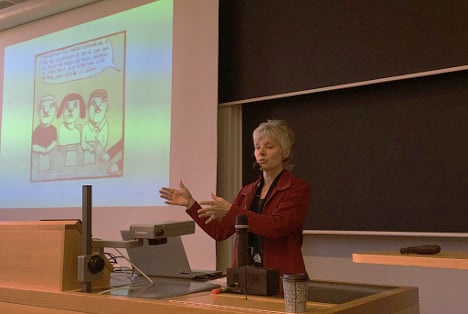Over the next four years, Sweden will devote 25 million kronor to help 33 universities and university colleges around the country with gender equality integration initiatives.
“There is a structure within academia that systematically marginalizes women,” says Kersten Alnebratt from Swedish Secretariat for Gender Research. “The conditions for carrying out research are worse for women than for men, and men get a larger percentage of both internal and external research funding.
This reality affects women’s career trajectories within academia, she added – an issue the government hopes to address.
Since 2013, the Secretariat has supported more gender equality efforts at 60 different government agencies, including several research councils and institutions of higher learning.
Now the government wants to apply some of the lessons learned and spread them further within Sweden’s higher education sector.
‘It is important that all aspects of our academic institutions be subject to active gender equality work,’ Helene Hellmark Knutsson, Swedish Minister for Higher Education and Research, wrote in a debate article published in Metro earlier this year.
Specifically, schools must develop a plan for their gender mainstreaming efforts that support national gender equality objectives, such as equality in career opportunities, choice of education and graduation rates.
The new initiative kicked off with an event in Stockholm that featured several lectures and group discussion on topics that will shape the work ahead.
“It’s bizarre to believe that researchers aren’t affected by societal norms,” Lisbeth Söderqvist, a senior analyst at the Swedish Research Council (Vetenskapsrådet), told the audience.
At the event, organised by the Secretariat for Gender Research, attendees discussed several strategic areas to focus on in pursuing their gender mainstreaming efforts, including academic leadership and governance; working environment; career opportunities and assessment; and how academic programmes are organized.
While all public universities and university colleges are expected to increase their gender mainstreaming efforts in the years ahead, the University of Gothenburg – home to the Swedish Secretariat for Gender Research – has already taken action.
Back in 2014, the university launched a gender equality pilot programme that will intensify in 2016, resulting in one institution per department deepening its gender equality work by choosing certain priority issues.
Rector Pan Fredman expects the efforts will result in gender mainstreaming being an obvious part of daily work at the university.
“I really hope that we realize how we can work with this systematically and highlight where exactly we are, consciously or unconsciously, in terms of fostering gender equality,” she says. “Now we’ll get people who work here to see it as part of our operations; that it’s not a project that will eventually be shut down.”
Chalmers Technical University, also in Gothenburg, is also taking the lead in promoting gender equality via a pilot programme that will look at the school’s recruitment processes.
“This issue has been discussed for decades without things having changed much,” says Rector Stefan Bengtsson. “I think that gender mainstreaming is a very good strategy in that we go straight into ordinary processes and daily create awareness and attention about the issue.”
According to the conditions accompanying the government’s injection of funding, all schools are to submit their gender mainstreaming plans by May 15, 2017, followed by annual reporting on measures and results throughout the programme period.
The schools’ work will be supported by the Secretariat for Gender Research, which plans to create tailored assistance plans to meet the conditions at each individual university or university college.
“Two things are needed for any serious work to be done. One is to act according to actual problems; to define what the problem is and how it should be solved,” says Alnebratt. “The other is total engagement by leadership that goes beyond lip service and shows a commitment to taking the measures required.”


 Please whitelist us to continue reading.
Please whitelist us to continue reading.